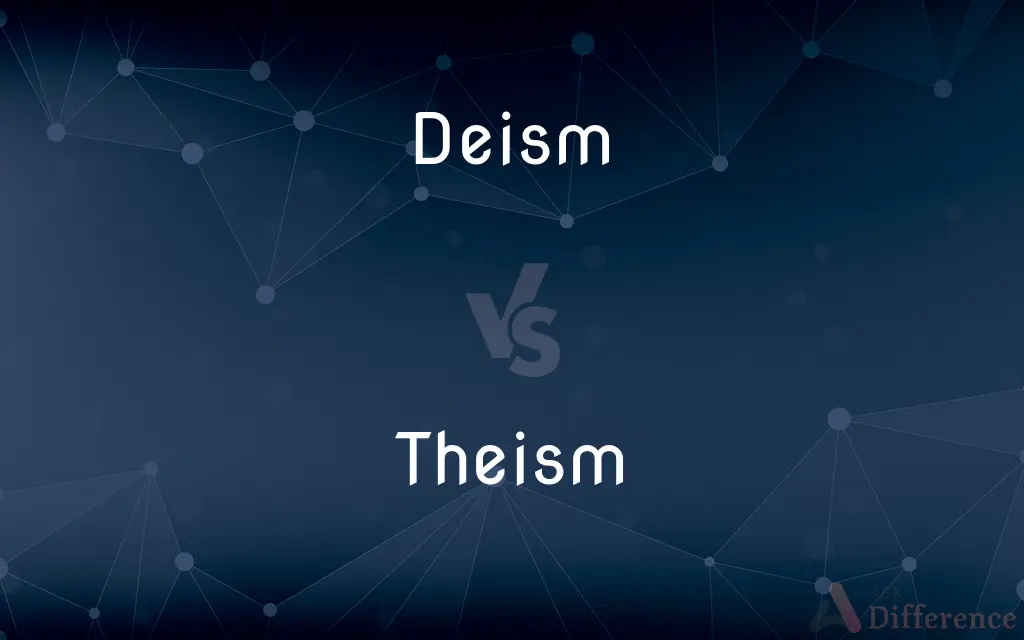Deism vs. Theism — What's the Difference?
Edited by Tayyaba Rehman — By Fiza Rafique — Updated on September 26, 2023
Deism is the belief in a creator who doesn't intervene in the universe, while Theism believes in a personal god who interacts with creation. Both acknowledge a higher power but differ in divine involvement.

Difference Between Deism and Theism
Table of Contents
ADVERTISEMENT
Key Differences
Deism and Theism, while both acknowledging the existence of a deity, have their nuances in understanding the nature and role of this deity. Deism posits that there is a supreme being who created the universe but doesn't actively participate in its affairs. This god, according to Deists, does not interfere, answer prayers, or send prophets. It's a watchmaker god, setting things in motion and then stepping back.
Theism, on the other hand, subscribes to the idea of a personal god who is actively involved in the universe. Theists often believe in a god who answers prayers, intervenes in human affairs, and has a relationship with its believers. This concept aligns more closely with most of the world's major religions where the divine plays a dynamic role.
Interestingly, Deism emerged largely during the Enlightenment period, drawing from scientific discoveries that suggested a mechanistic universe. Deists often argue that reason and observation of the natural world, without the need for organized religion, can determine the existence of a creator.
Conversely, Theism has been a foundational element of numerous religious traditions for millennia. Theistic beliefs underline religions like Christianity, Islam, and Hinduism where the divine not only creates but sustains and engages with creation.
Comparison Chart
Nature of God
Non-intervening, impersonal
Personal, intervening
ADVERTISEMENT
Historical Emergence
Enlightenment period
Ancient, foundational to many religions
Divine Interaction
God doesn't intervene after creation
God actively involved, answers prayers
Basis of Belief
Reason and observation
Religious texts, traditions, personal experiences
Representation in Religions
Not central to major world religions
Central to Christianity, Islam, Hinduism, etc.
Compare with Definitions
Deism
Belief in a creator god who doesn't intervene.
Many Enlightenment thinkers leaned towards Deism.
Theism
Belief in an actively intervening god.
Christianity is rooted in Theism.
Deism
Rejects organized religions' claims of divine interventions.
Deism does not believe in miracles or prophecies.
Theism
God is both the creator and sustainer of the universe.
In Theism, God's presence and influence are continuous.
Deism
Relies on reason rather than revelation.
Through reason, Deism asserts the existence of a creator.
Theism
Aligns with most major world religions.
Hinduism and Islam are also theistic religions.
Deism
God sets the universe in motion but remains detached.
Deism likens God to a watchmaker.
Theism
Recognizes divine revelations, miracles, and prophecies.
Theism accepts the possibility of divine miracles.
Deism
The universe operates through natural laws without divine meddling.
In Deism, the laws of nature are constants set by a creator.
Theism
God is personal and has a relationship with believers.
Through prayer, Theism emphasizes a personal connection with God.
Deism
Deism ( DEE-iz-əm or DAY-iz-əm; derived from Latin "deus" meaning "god") is the philosophical position that rejects revelation as a source of religious knowledge and asserts that reason and observation of the natural world are sufficient to establish the existence of a Supreme Being or creator of the universe.At least as far back as Thomas Aquinas, Christian thought has recognized two sources of knowledge of God: revelation and "natural reason". The study of the truths revealed by reason is called natural theology.
Theism
Theism is broadly defined as the belief in the existence of a supreme being or deities. In common parlance, or when contrasted with deism, the term often describes the classical conception of God that is found in monotheism (also referred to as classical theism) – or gods found in polytheistic religions—a belief in God or in gods without the rejection of revelation as is characteristic of deism.Atheism is commonly understood as non-acceptance or rejection of theism in the broadest sense of theism, i.e.
Deism
A religious belief holding that God created the universe and established rationally comprehensible moral and natural laws but does not intervene in human affairs through miracles or supernatural revelation.
Theism
Belief in the existence of a god or gods, especially belief in a personal God as creator and ruler of the world.
Deism
A philosophical belief in the existence of a god (or goddess) knowable through human reason; especially, a belief in a creator god unaccompanied by any belief in supernatural phenomena or specific religious doctrines.
Theism
Belief in the existence of at least one deity.
Deism
Belief in a god who ceased to intervene with existence after acting as the cause of the cosmos.
Theism
(narrowly) Belief in the existence of a personal creator god, goddess, gods and/or goddesses present and active in the governance and organization of the world and the universe. The God may be known by or through revelation.
Deism
The doctrine or creed of a deist; the belief or system of those who acknowledge the existence of one God, but deny revelation.
Theism
A morbid condition resulting from excessive consumption of tea.
Deism
The form of theological rationalism that believes in God on the basis of reason without reference to revelation
Theism
The belief or acknowledgment of the existence of a God, as opposed to atheism, pantheism, or polytheism.
Theism
The morbid condition resulting from the excessive use of tea.
Theism
The doctrine or belief in the existence of a God or gods
Common Curiosities
How does Theism view miracles?
Theism typically accepts the possibility of miracles, viewing them as divine interventions.
Are Deism and Theism both forms of belief in God?
Yes, both believe in a higher power but differ in how they perceive divine involvement.
Does Deism recognize any religious scriptures?
Deism generally relies on reason and doesn't prioritize scriptures as Theism does.
Is Deism a result of the Enlightenment period?
Largely, yes. Deism emerged and gained prominence during the Enlightenment.
How do Deists view the afterlife?
Deism doesn't have a standardized view on the afterlife like some theistic religions do.
Are all religions theistic?
Not all, but many major world religions like Christianity and Islam are rooted in Theism.
Are there any specific religious texts for Deists?
No, Deism is more about individual reason than any canonical texts.
Is prayer central to Theism?
Yes, prayer is often seen as a way to communicate with the divine in Theistic beliefs.
Do Theists believe in an interactive god?
Yes, Theism believes in a god who can intervene and interact with believers.
Is Deism prevalent in any major world religion?
No, Deism is not central to any major world religion in the way Theism is.
Does Theism always involve worship practices?
Often, yes. Many theistic beliefs are accompanied by specific worship rituals.
How does Deism reconcile science and belief in god?
Deists often see the universe's natural laws as proof of an intelligent creator, harmonizing belief with scientific understanding.
Is there a personal relationship with god in Theism?
Yes, Theism emphasizes a personal relationship between god and believers.
Do Deists believe in prophets?
Generally, no. Deism does not recognize divinely-inspired prophets like Theism does.
Do Deists reject the idea of god?
No, they believe in a creator god but view this deity as non-intervening.
Share Your Discovery

Previous Comparison
Endoskeleton vs. Exoskeleton
Next Comparison
Peeced vs. PeeledAuthor Spotlight
Written by
Fiza RafiqueFiza Rafique is a skilled content writer at AskDifference.com, where she meticulously refines and enhances written pieces. Drawing from her vast editorial expertise, Fiza ensures clarity, accuracy, and precision in every article. Passionate about language, she continually seeks to elevate the quality of content for readers worldwide.
Edited by
Tayyaba RehmanTayyaba Rehman is a distinguished writer, currently serving as a primary contributor to askdifference.com. As a researcher in semantics and etymology, Tayyaba's passion for the complexity of languages and their distinctions has found a perfect home on the platform. Tayyaba delves into the intricacies of language, distinguishing between commonly confused words and phrases, thereby providing clarity for readers worldwide.















































